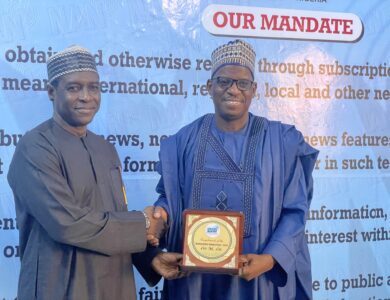The Federal Government has inaugurated a National Task Force on Antimicrobial Resistance (AMR) Stewardship, marking a decisive step toward combating the growing threat of antimicrobial resistance in the country.
AMR is a critical global health issue where infections from bacteria, fungi, viruses, and parasites become resistant to treatments, leading to 4.95 million deaths globally in 2019, with 1.27 million directly attributed to AMR. In Nigeria, AMR is responsible for 64,500 deaths, disproportionately affecting children under five.
The Minister of State for Health, Dr. Tunji Alausa, speaking at the launch in Abuja on Tuesday, explained that this initiative is aimed at addressing the growing threat of AMR in Nigeria.

Alausa added that the task force, comprising experts from healthcare, academia, and other relevant sectors, is set to implement a national action plan to curb the spread of AMR and safeguard public health.
He stressed the gravity of the AMR challenge, calling it a “silent but deadly threat” with profound implications for human health, animal health, agriculture, and the environment.

He highlighted that Nigeria is among the countries with the highest number of deaths associated with AMR, noting that in 2019, the nation recorded 64,500 deaths directly attributable to AMR and 263,400 deaths associated with it.

“AMR deaths in Nigeria are higher than those from enteric infections, respiratory infections, tuberculosis, maternal and neonatal disorders, neglected tropical diseases, malaria, and cardiovascular diseases,” he stated.
The minister also pointed out the absence of a national Antimicrobial Stewardship (AMS) program to monitor the use and sensitivity patterns of antimicrobials across the country.
He warned that this gap poses a significant danger, potentially leading to increased antimicrobial resistance, higher morbidity and mortality rates, and further strain on the country’s healthcare system.
He announced that the task force would coordinate AMR surveillance and research activities nationwide, review existing data, align agencies, and establish an effective nationwide surveillance system.
An integrated digital information platform will be created to facilitate communication, coordination, and dissemination of AMR-related information. The platform will support the establishment of AMS programs in both public and private health sectors and promote state and local government leadership in AMR surveillance and stewardship.
The task force will also promote awareness of AMR among the public and healthcare providers, build capacity through training programs for infectious disease physicians and pharmacists, and develop strategies to engage and train personnel at patent pharmacies.
Dr. Alausa described the inauguration as the beginning of a coordinated and strategic response by the government to tackle AMR and expressed confidence that the task force, through its comprehensive and multisectoral approach, will play a crucial role in mitigating the impact of AMR in the country.
The World Health Organization (WHO) Representative to Nigeria, Dr. Walter Mulombo, acknowledged key stakeholders in the fight against AMR and stressed the urgency of addressing AMR as a critical national public health issue.
Mulombo highlighted significant global resolutions and events in 2024, including WHO strategic priorities for addressing drug-resistant bacterial infections and upcoming high-level meetings on AMR, demonstrating a global commitment to tackling the issue.
He detailed the severe health, economic, and development impacts of AMR in Nigeria, including high mortality rates, economic losses, and negative effects on sustainable development goals (SDGs).
He underscored the support from WHO and the commitment to align with Nigeria’s priorities to enhance the national AMR response, implement the National Action Plan (NAP-2.0), and support evidence-based interventions.
Dr. Omobosola Akinsete, national coordinator of the Antimicrobial Stewardship Taskforce for Nigeria, stressed that AMR is a global public health crisis threatening healthcare systems, including Nigeria’s.
Akinsete emphasized the need for immediate action to preserve the effectiveness of antimicrobials and outlined the task force’s mission to coordinate efforts across different sectors to combat AMR in Nigeria.
ALSO READ:You’ll enjoy dividends of democracy, Tinubu’s aide assures Ondo community
She highlighted the importance of collaboration, data generation, and the promotion of evidence-based antimicrobial use and called for a unified effort involving healthcare professionals, researchers, government agencies, and the public to address AMR and ensure a sustainable healthcare system for future generations.
Earlier, Ms. Daju Kachollom, Permanent Secretary of the Federal Ministry of Health, stated that the inauguration of the Taskforce on Antimicrobial Stewardship marked a pivotal moment in Nigeria’s healthcare journey, signaling the nation’s commitment to addressing one of the most pressing public health challenges of our time.
Kachollom noted that the task force’s work would be instrumental in guiding the country’s efforts to combat AMR and protect the health of its citizens.
She acknowledged that AMR poses a significant threat to Nigeria’s health security, economic development, and social well-being, highlighting the urgent need for a coordinated response.
She explained that the misuse and overuse of antimicrobials have accelerated the emergence of resistant microorganisms, making infections harder to treat and increasing mortality rates.
She outlined specific challenges Nigeria faces in combating AMR, including limited access to quality healthcare, inadequate surveillance and monitoring, poor infection prevention and control practices, and the misuse of antimicrobials in both human and animal health.
The primary drivers of AMR include improper use of antimicrobials, poor prescription practices, the circulation of substandard drugs, and inadequate sanitation.








